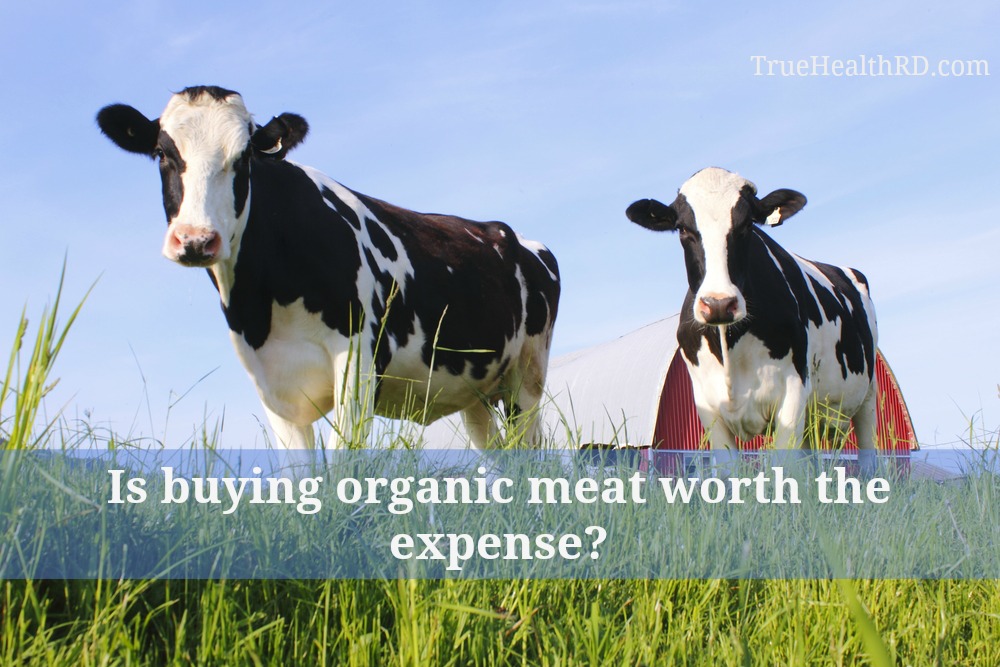You may have asked yourself – is buying organic meat worth the expense?
Technically, it’s up to you, but there are important factors about our meat industry you can’t afford not to know!
Why it’s important to buy organic meat?
Organic meat products such as beef and other meats, poultry, eggs, and dairy products are not injected with antibiotics or growth hormones as conventional meats are.
Being that over 90% of our country’s food has been manipulated in some way; either genetically or with added hormones, pesticides, herbicides, synthetic fertilizers, etc, non-organic food has been linked to a number of diseases and health conditions.
Most meat in the US (beef, pork, chicken, turkey, and other meats) is raised in confined animal feeding operations, or CAFO’s. It’s a corporate-controlled system characterized by large-scale, centralized, low profit-margin production, processing and distribution systems.
Check out this video for a glimpse of what I’m talking about.
Our food production has been built around efficiency—producing more for less. Our animals are crammed into feedlots, where they’re raised in unhealthy, unsanitary, and cruel conditions because this is the “cheapest” way to raise meat, for the largest profits.
Smaller American ranchers wishing to offer traditionally raised grass-fed meats, who care about quality and environmental impact, face higher operational costs and must charge a premium for their product.
Organic meat can be expensive. But it may not have to break the bank.
According to the Academy of Nutrition and Dietetics, 4 ounces of grilled chicken (a little larger than the size of a deck of cards) contain about 36 grams of protein. And 31 grams of protein is in 3 oz meat.
On average, a healthy adult only needs approximately 50-90g of protein per day. We don’t need near as much meat as think.
Other sources of protein include:
- Beans
- Legumes
- Nuts
- Seeds
Protein is also found minimally in:
- Grains
- Fruits
- Vegetables
What about other organic foods?
If you’re having to choose when to buy organic and when not – here is what I recommend:
Always choose organic meat, poultry, dairy, and eggs over anything else organic.
Produce is runner up.
When it comes to produce, organic means it is grown without the use of pesticides & herbicides, synthetic fertilizers, genetically modified organisms, or ionizing radiation.
While it’s not exactly beneficial to munch on pesticides and herbicides, by choosing organic meat you’re avoiding consuming antibiotics, growth hormones and superbugs such as E. Coli, Salmonella and Enterococcus – which in turn, can kill all the good bacteria in our guts that support our immune system.
But know this! It’s better to eat non-organic fruits and vegetables than no fruits and vegetables at all!
Purchasing Cheat Sheet:
Here’s what to look for when buying meat, poultry, eggs & seafood at the store.
Eggs – organic, free-range
Meat – organic, grass-fed
Poultry –organic, free-range
Fish – Alaskan wild-caught, or wild-caught (not from China)
If you’re at the farmer’s market – ask the farmer how their animals are raised & processed. You know your doctor, you know your dentist – know your farmers!
More times than not, farmers that are working towards traditional and organic farming methods are happy to answer any questions you have!
Where to find grass-fed beef, raw milk and pasteurized eggs
Here are the leading sites to find grass-fed beef, free-range chicken, raw milk and pasteurized eggs near you!
http://www.ams.usda.gov/local-food-directories/farmersmarkets
http://www.eatwild.com/
References:
http://www.organic.org/home/faq
https://www.ota.com/resources/market-analysis
Dr. Mercola
Academy of Nutrition and Dietetics
Dr. Joshua Axe


